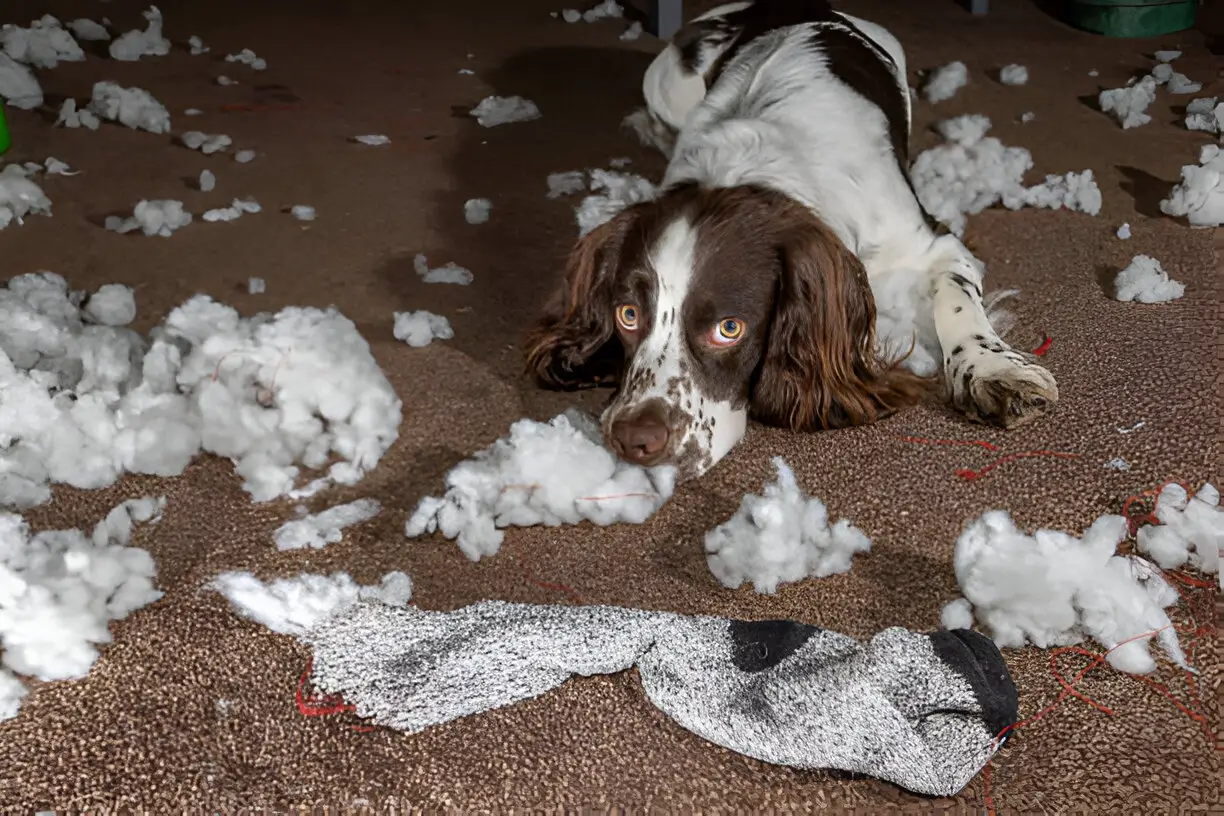Dogs can cause significant damage to a house through chewing, scratching, and marking. Understanding these behaviors and how to mitigate them is essential for maintaining a harmonious home environment.
Dogs bring joy, companionship, and a sense of security to our lives. However, they can also cause considerable damage to our homes if their behaviors are not properly managed. This article explores the various types of damage dogs can inflict on a house, the reasons behind these behaviors, and practical tips for prevention and repair.
Types of Damage Dogs Can Cause
1. Chewing and Gnawing
- Furniture and Woodwork: Dogs, especially puppies, love to chew. This can lead to damaged furniture legs, baseboards, and door frames.
- Electrical Cords: Chewing on electrical cords is not only damaging but also dangerous for your dog.
- Personal Items: Shoes, remote controls, and children’s toys are often victims of a dog’s chewing habits.
2. Scratching
- Doors and Walls: Dogs may scratch at doors and walls, especially if they are anxious or trying to get outside.
- Flooring: Hardwood floors, carpets, and tiles can all suffer from a dog’s nails if they are not kept trimmed.
3. Marking and Soiling
- Urinating Indoors: Untrained or anxious dogs may urinate indoors, leading to stains and odors that are difficult to remove.
- Defecating Indoors: Similar to urination, indoor defecation can cause significant hygiene issues and damage to flooring.
4. Digging
- Carpet and Rugs: Some dogs have a natural instinct to dig, which can result in torn carpets and rugs.
- Yard Damage: While not inside the house, digging in the yard can lead to a messy and uneven lawn.
Reasons Behind Destructive Behaviors
- Teething: Puppies chew to relieve the discomfort of teething.
- Boredom: Dogs left alone for long periods may chew or dig out of boredom.
- Anxiety: Separation anxiety can lead to destructive behaviors such as scratching and chewing.
- Lack of Training: Dogs that are not properly trained may not understand what is acceptable to chew or scratch.
- Territorial Marking: Unneutered dogs, in particular, may mark their territory by urinating indoors.
Preventing and Managing Damage
1. Training and Socialization
- Basic Commands: Teaching your dog basic commands like “sit,” “stay,” and “leave it” can help manage destructive behaviors.
- Crate Training: Proper crate training can provide a safe space for your dog and prevent damage when you are not home.
2. Providing Appropriate Chew Toys
- Durable Toys: Invest in high-quality, durable chew toys to satisfy your dog’s need to chew.
- Rotation: Rotate toys to keep your dog interested and engaged.
3. Regular Exercise
- Daily Walks: Ensure your dog gets enough physical exercise to reduce boredom and anxiety.
- Playtime: Engage in regular playtime to keep your dog mentally stimulated.
4. Behavioral Training
- Professional Help: If your dog exhibits severe anxiety or destructive behaviors, consider consulting a professional dog trainer or behaviorist.
- Positive Reinforcement: Use positive reinforcement techniques to encourage good behavior.
5. Home Modifications
- Protective Barriers: Use baby gates or barriers to restrict access to certain areas of the house.
- Furniture Covers: Protect furniture with covers that can be easily washed or replaced.
- Floor Protection: Use rugs or mats in high-traffic areas to protect flooring.
Repairing Damage
1. Chewed Furniture and Woodwork
- Wood Filler: Use wood filler to repair minor chew marks on furniture and woodwork.
- Sanding and Staining: Sand down damaged areas and apply a matching stain to restore the appearance.
2. Scratched Doors and Walls
- Spackle and Paint: Fill in scratches with spackle and repaint the area to match the existing color.
- Door Guards: Install door guards to prevent future scratching.
3. Damaged Flooring
- Carpet Repair Kits: Use carpet repair kits to fix small tears or holes in carpets.
- Refinishing Hardwood Floors: Sand and refinish hardwood floors to remove scratches and restore their appearance.
4. Odor and Stain Removal
- Enzymatic Cleaners: Use enzymatic cleaners to break down urine stains and eliminate odors.
- Professional Cleaning: For severe stains and odors, consider hiring a professional cleaning service.
Conclusion
While dogs can cause significant damage to a house, understanding the reasons behind their behaviors and taking proactive steps can help mitigate these issues. With proper training, exercise, and home modifications, you can enjoy the companionship of your dog without sacrificing the integrity of your home.
The photo featured below the post headline is Credit: Ian Dyball/istockphoto
I hope you find this post helpful and informative. If Yes’ feel free to share it with your friends!
Frequently Asked Questions
How can I stop my dog from chewing on furniture?
Provide plenty of chew toys, use deterrent sprays on furniture, and ensure your dog gets enough exercise and mental stimulation.
What should I do if my dog scratches the doors?
Trim your dog’s nails regularly, use door guards, and address any underlying anxiety or behavioral issues.
How do I remove urine stains and odors from carpets?
Use enzymatic cleaners specifically designed for pet stains, and consider professional cleaning for severe cases.
Can professional training help with destructive behaviors?
Yes, professional training can address underlying behavioral issues and teach your dog appropriate behaviors.

